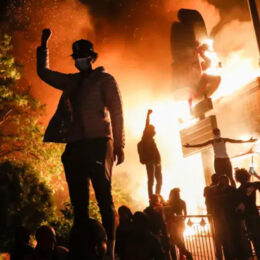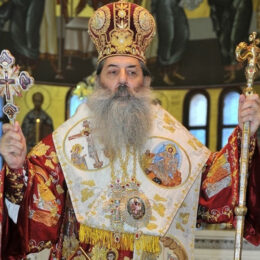The New Yorker Orhan Pamuk Posted 2005-12-12
Turkish author on trial for writing about the Turkish massacre of Armenians.
In Istanbul this Friday—in Şişli, the district where I have spent my whole life, in the courthouse directly opposite the three-story house where my grandmother lived alone for forty years—I will stand before a judge. My crime is to have “publicly denigrated Turkish identity.” The prosecutor will ask that I be imprisoned for three years. I should perhaps find it worrying that the Turkish-Armenian journalist Hrant Dink was tried in the same court for the same offense, under Article 301 of the same statute, and was found guilty, but I remain optimistic. For, like my lawyer, I believe that the case against me is thin; I do not think I will end up in jail.
This makes it somewhat embarrassing to see my trial overdramatized. I am only too aware that most of the Istanbul friends from whom I have sought advice have at some point undergone much harsher interrogation and lost many years to court cases and prison sentences just because of a book, just because of something they had written. Living as I do in a country that honors its pashas, saints, and policemen at every opportunity but refuses to honor its writers until they have spent years in courts and in prisons, I cannot say I was surprised to be put on trial. I understand why friends smile and say that I am at last “a real Turkish writer.” But when I uttered the words that landed me in trouble I was not seeking that kind of honor.




Turkey has proved itself European in one sense – it is infected by the same strain of aggressive, often violent nationalism we have seen on display in the other European states that were once part of the Ottoman Empire. In Turkey nationalism has meant not just changing the names of formerly Greek and Armenian cities to Turkish names, but even arguing that the ruins found in those places were never really Greek or Armenian at all, but belonged to a proto-Turkish “Hittite” race.
In a sense the official denial by the Turkish State that other millions of non-Turks once called modern day Turkey their home, echoes similar claims in Balkan countries. Croatia would like to deny that the Krajina region was until 1995 primarily Serbian. Croatian Nazi collaborators who carried out sickening massacres of Serbs are celebrated to this day as Croatian national heroes. The Serbs, of course attempted unsuccessfully to erase the Bosnian and Albanian presence from areas they would like to claim as Serbian with a loss of life etimated at roughly 250,000. Greeks and Slavic Macedonians have faced off in a dispute over Macedonia that has gratefully only been a war of words.
The Greek claim that “Macedonia is Greek and always has been” is positively hilarious when one recalls that the French borrowed the name Macedon in the late 1800s to describe a salad comprised of a wild assortment of different greens and vegetables. Slavs in particular settled in Macedonia in large numbers during both the Byzantine and Ottoman periods, gradually assumming a Greek identity. So it’s likely that the Greek protestor carrying the sign that reads “Macedonia is Greek!” is descended at least partially from someone who, hundreds of years ago, crossed the frozen Danube speaking Slavic.
The extreme nationalism in the Balkans and Turkey is both a reaction to and backlash from the forced multi-culturalism of the Ottoman centuries. Under Ottoman rule people were defined by their religion and not their ethnicity, which is why the Greek Patriarch was given authority by the Sultan over all Christians in Ottoman lands, Greek or not. We don’t tend to think of Turkish identity as being “supressed” under the Ottomans, but in a sense it was “self-supressed.”
The Sultans assuming control of Christian lands relied on local Christian talent. Farming and soldiering were considered the only fit vocations for Turks, so it was the non-Turks who kept thhe economy going. In fact, there was not even a written Turkish language until the 20th century when Kemal Ataturk introduced one. The Armenian Holocaust and the subsequent expulsion of the Greeks left Turkey bereft of its professional and commercial class. This must of resulted in among other things, an enormous sense of ethinc inferiority on part of the Turks and the fierce desire to overcompensate that we still see on display today.
Hitler asked “Who remembers the Armenians?” when his lieutenants were anxious about whether they could pull off the extermination of the Jews. Now we know what happens to people who *do* remember them.
Pamuk criticizes not only Turkey, but all countries that supress discussion of the darker chapters in their own national history. Turkey may have gone further than other countries by making such discussion literally a crime, but many other nations are guilty of some degree of the same type of historical censorship.
In particular, Pamuk mentions the refusal of Japan to acknowlege and apologize for their crimes in WWII, such as the Rape of Nanking when Japanese soldiers murdered over 300,000 Chinese civilians in a matter of weeks. Likewise there is little reflection in Russia today over the destruction of the Chechen city of Grozny which displaced over a half a million people. The French lose very little sleep over the brutal tactics they used to supress the Algerians during the nineteen-fifties. “Bomber Harris”, the British RAF commander who planned the firebombing of Dresden, was honored a few years ago with a statue in London. In the United States, Senator John Kerry, is still villified for testifying before Congress as a young veteran about the (well documented) atrocities committed by US troops in Viet Nam.
As Pamuk points out the United States has yet to express any regret for launching a war against Iraq for reasons that have been proven completely false and deliberately manufactured and which has resulted in the deaths of at least 30,000 Iraqi civilians.
“Watergate doesn’t bother me”, the southern rock band Lynyrd Skynyrd sang in their hit song “Sweet Home Alabama”, “does your conscience bother you? Tell the truth.” This ignorant statement reflected the belief of many in the United States that a staunch refusal to engage in national soul-searching or reflection should be celebrated as a national virtue.
The only nation I have ever seen confront its past openly and honestly is Germany. When Chancellor Willie Brandt crumpled to his knees and wept with shame while laying a wreath at the gates of Auswitz – that was about as close to an act of national contrition as we are ever going to see.
So yes, the Turks should acknowlege the crimes committed against the Armenians and others. However, other nations would have more credibility asking the Turks to do so, if they confronted their own misdeeds and mistakes with the same willingness and honesty they are demanding from the Turks.
Somehow I knew that the subject was going to be changed from criticism of Turkey for the genocide of the Armenians to criticism of the US for the liberation of the Iraqis. We even managed to squeeze in praise for John Kerry and lament for those nasty things that were said about him. Very economical prose. And very predictable.
Matthew 7:3-5
“And why worry about a speck in your friend’s eye when you have a log in your own? How can you think of saying, ‘Let me help you get rid of that speck in your eye,’ when you can’t see past the log in your own eye? Hypocrite! First get rid of the log from your own eye; then perhaps you will see well enough to deal with the speck in your friend’s eye.”
Dean what’s your point?
Jerry and all,
I encourage you all to go over to Redstate.org for an eyefull at how our fellow ‘conservatives’ view Turkey. Here’s a gem from a diary promoted on the front page of the Website.
The full article is here: http://www.redstate.org/story/2005/12/28/202444/23
Conservatives love Turkey. They excuse Turkey’s slaughter of Armenians and Greeks without so much as a second thought. These same so-called ‘conservatives’ also believe that ‘democracy’ requires that the Muslim majority in a nation be able to incorporate Sharia into the national law and force non-Muslims to abide by Muslim laws.
Spend some time surfing a conservative site. As an Orthodox Christian, you will be amazed at what you find. The Assyrians, the Copts, the Orthodox are all just so much annoyances in their grand scheme to ‘democratize’ the Middle East.
Go ahead, if you wish, and pretend that conservatives are somehow doing something positive about Islam. Nothing could be farther from the truth. The current ‘orthodoxy’ among Republicans is that we have to turn over the Middle East to the democratically elected Islamists so that the people will stop supporting terrorists. These democratically elected Islamists will be busy oppressing native Christians, but the idea is that after 40 or 50 years, the people will get fed up with Islamist rule (which will remain compatible with Democracy) and will look for more progressive leadership.
This is Utopian to the maximum, and shows a marked disregard for non-Muslim minorities who are largely supported and protected by secular dictatorships. But there it is, our new conservative agenda for the Middle East. We could call it ‘back to the future.’
Glen – you have a different intepretation than I do. You see Turkish intolerance for it’s non-Turkish minorties driven by religion. I believe that it is driven by nationalism.
Kemal Attaturk, who is still the guiding figure for those in power in Turkey, was above all a secularist, Attaturk banned the fez and the turban and introduced greater freedom for women. Attaturk swept away any religious practice that he saw as an obstacle to Turkey’s modernization.
Attaturk’s secular outlook did not make him more tolerant Armenian and Greek minorities. To the contrary he saw the minorities as a threat to Turkish nationhood, as do Turkey’s rulers today. Turkish nationhood was promoted as an ideology, like Mussolini’s Fascism and Hitlers Naziism, with its own sets of beliefs about a single, homgenouse Turkish race occupying a homeland.
The idea that other non-Turkish peoples with a separate history might have inhabited their homeland is a direct challenge to official state ideology of Turkish nationhood.
Don’t get me wrong. I think neoconservative foreign policy ideas are as misguided as you do. Increasing islamic fundamentalism in Turkey is also a cause for concern. However, up until now I believe the problem is one of over-aggressive nationalism and not religion.
It is true the Attaturk was a secular nationalist. However, it is not as if the pre-Attaturk regime was somehow a bed of roses and a fountain of sweetness and light.
Neither the aggressively nationalistic government of Attaturk nor the pre-existing Ottoman State are fit models of government. However, what is occurring right now is a paradigm shift among conservatives, and one you need to pay close attention to.
The conservatives have now come to the conclusion that the problem with Turkey wasn’t that Attaturk was a proto-fascist who killed hundreds of thousands of Christians. Instead, they have come to the conclusion that the problem with Attaturk was that he banned the fez and tried to move in a secular direction. They aren’t particularly concerned about his killing of Christians, either. Just so much collateral damage.
Therefore, the idea as expressed by the diary I linked to, was to allow the Islamist forces repressed by secular regimes to burst forth. Big problem with that though, is that Islamist regimes aren’t any better than the secular ones they replace.
An example, is Turkey. Right here, right now, Turkey has an Islamist regime. How is that working out?
How has the Bush administration responded to all this?
The neocon right is willing to overlook anything in its quest to prove that spreading Democracy by force into the Muslim world will ‘work.’ To make that case, it is changing what the definition of ‘work’ means in terms of representative government. Re-combining mosque and state is a step backwards that will not lead to an improvement of the situation, and will instead lead to a major reduction in the status of non-Muslims.
Attaturk’s model, of course, is not a good one either. However, the Ba’athist model as practices in Syria or the Nasserist model in Egypt have been much more successful in terms of protecting religious minorities and fostering the development of secular elements in society that can work across religious divides.
Those two countries are on the outs, however, and the new model is looking more like Iran everyday.
What seems to me to be underlying all this is a simple fact. The Islamists and the new ‘conservatives’ are, in fact, soul mates. They have a natural alliance because they view the world the same way. Winning an election means that you get to do whatever you want. That is their view of ‘democracy.’ Bush won, so he gets to fight his war his way, with no oversight. The Shia Parties win in Iraq, they get to mandate the headscarf for all women, even those who are Christians. Dissenters are trouble makers who need to be forced into line.
Forget natural law, forget inalienable rights of man, or any of the other founding precepts of our Western philosophy. This is about power, and that seems to be the only thing new ‘conservatives’ respect.